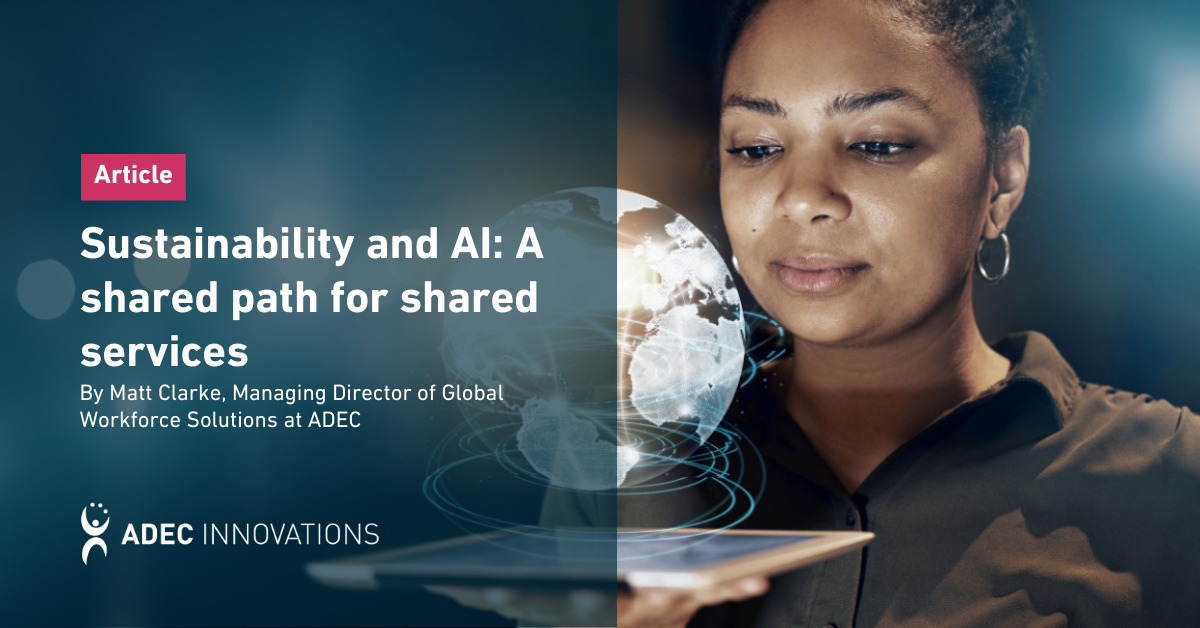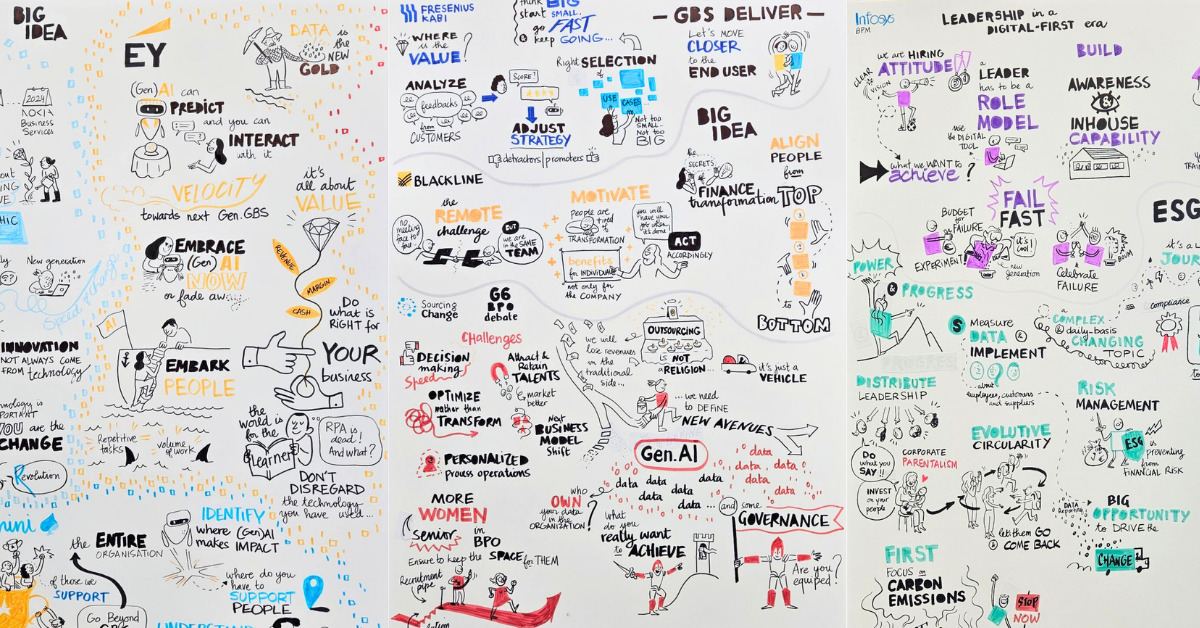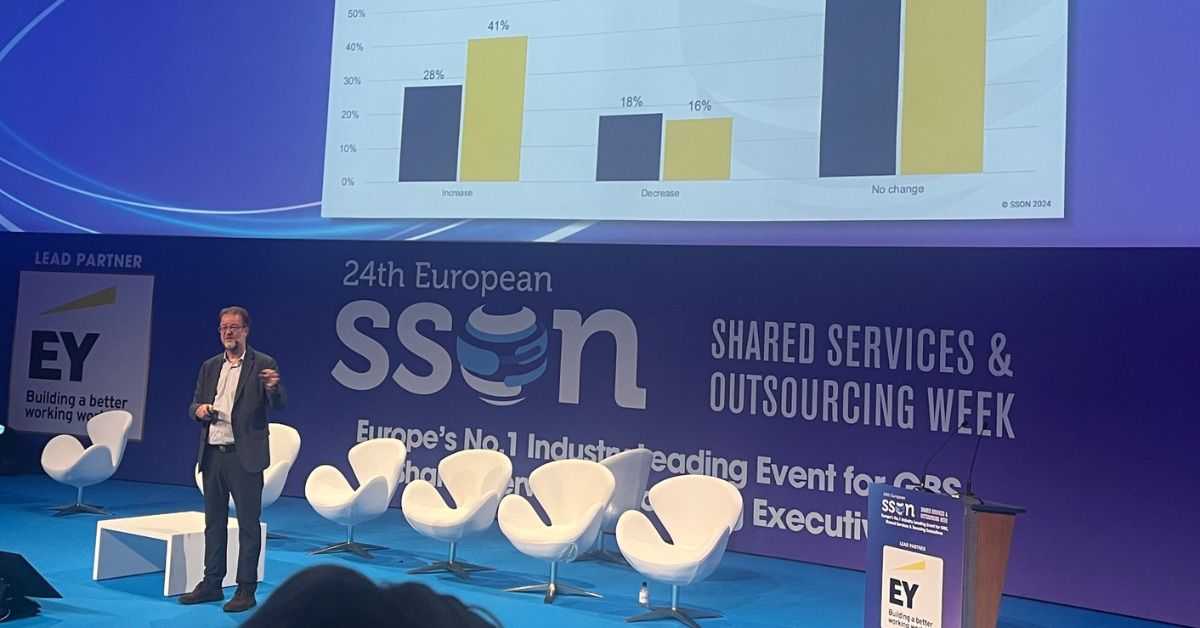AI and Sustainability: A Shared Path for Shared Services
Article
Reflections on SSOW Europe 2024: Matt Clarke, Managing Director of Global Workforce Solutions at ADEC
I recently had the pleasure of attending SSON’s Shared Services and Outsourcing Week – Europe.
It was a well organised, high-quality event featuring many excellent speakers, attended by hundreds of Global Business Services (GBS) leaders from some of the most impressive companies on the planet. Spending the week in beautiful Cascais, Lisbon only improved the experience.
It won’t surprise you to learn that almost every conversation was about AI.
But even though AI got most of the attention, I came home with a real sense of optimism about GBS’ opportunity to drive sustainability.
I’d like to tell you why.
AI’s impact is becoming real

Over the course of the three days of the event, a brilliant artist drew doodles based on the topics covered at the various talks. Naturally, with AI dominating most discussions, there were a lot of robots in the resulting mural. But, as observed by Richard Williams, by the end of the event, the mural featured more people than robots.
This is a small point, but I think it demonstrates the maturity with which most GBS leaders think about AI. As exciting as these new technologies are, the focus is still – rightly – on people, and the commitment from leading organisations to retain people on their AI journey is laudable.
What I found interesting about the discussion of AI at the event – and why, on balance, I felt it deserved the limelight – is that organizations are sharing concrete and sophisticated use cases now. The value of these technologies is starting to become real. Leading organisations that are several years into their journey are clearly maturing their AI implementations and are seeing tangible benefits from the insights it is providing.
However, while there was no shortage of examples of how organisations are experimenting with generative AI implementations, it was clear there’s still a big gap between the perception of this budding technology and the reality.
It is still a minority of companies that have implemented AI in production environments. Indeed, the SSON Analytics survey highlights, excellently presented by Tom Bangermann, showed how most of the GBS community isn’t as far along the automation journey as the select few on the Most Admired list.
I think it’s safe to say we’re still in the very early stages of this trend, but I have no doubt that adoption and maturity will continue to increase.
As an aside, and as provider of outsourced services, I was encouraged that SSON’s research shows that 41% of GBS organizations expect to increase their use of outsourcing and only 16% to decrease in 2024.
Sustainability on a similar curve
Seeing the progress organizations have been making with AI gave me a real sense of optimism about how much more GBS can be doing to spearhead sustainability.
As with AI adoption, we’re still very much in the early stages of GBS taking on responsibility for Environmental, Social and Governance (ESG) practices. Currently there is a small but significant percentage who have ownership for these initiatives, either directly or indirectly. There is a real opportunity for GBS organisations to provide strategic value on this front.
And again, like with AI, there is real maturity in the way leading firms were thinking about the subject – even if there was only one panel discussion dedicated to ESG at this event.
Just as GBS is moving from a cost-saving mindset to one about adding strategic value, I was pleased to see a similar interest in moving from a compliance mindset about ESG to one about impact and value creation.
The impressive panel speakers, Susanne Dreyer, Rolf Lux, Ionna Botezatu and Leigh Nicholson, spoke generously about their experiences leading the charge for ESG and driving materiality assessments to make the best possible decisions. (Incidentally, if you’d like to learn a bit more about how GBS can lead the ESG charge, read ADEC’s latest guide.)
Notably, they highlighted the need to understand jurisdictions, start small and have a defined roadmap. Again, not dissimilar to AI where the emphasis is on starting with small experiments, failing\learning fast, and scaling success fast.
I also thought it was interesting that they pointed out how treating ESG like a compliance checkbox doesn’t really serve your stakeholders.

Just ticking boxes doesn’t meet shareholders’ expectations, it certainly doesn’t impress customers and crucially, purpose matters more than ever to employees.
It’s why I’d have loved to have seen more than a single discussion on these crucial topics. In particular, I’d have loved for more discussion around how Impact Sourcing can help GBS make a bigger strategic impact.
Not least because of the intense discussion that broke out during the G6 debate (moderated brilliantly by Deborah Kops who didn’t pull any punches) on the vital subject of why more women aren’t represented in senior BPO leadership roles.
But also, because ultimately, GBS is a human-centric effort that’s proving it can take on novel, strategic challenges and own complex initiatives like sustainability and AI.
I came away from the event with real confidence that in the coming years, we’ll see GBS successfully driving the sustainability agenda.
And if that gets even half the attention AI currently does, I think the world will be a better place for it.
—
This article was originally published on LinkedIn by Matt Clarke, MD of Global Workforce Solutions for ADEC.






